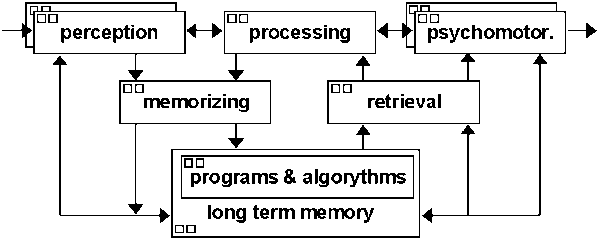THE
THEORY
OF INTELLIGENCE
OF INTELLIGENCE
- Intelligence is the
ability of living creatures to process information (definition).
- Intelligence really
exists (it is not merely a scientific concept). It is a functional characteristic
of the central nervous system, but its real nature is still unknown.
- Intelligence is a biologic
trait (a “hardware” characteristic) and is predominantly genetically
determined.
- Intelligence has a
typical curve of development. It grows till the point when central nervous
system biologically matures. After that point it progressively declines
with age. Because the actual mental functioning depends also on efficiency
of experiential abilities (see items below!), which do not decline with
age in adulthood, the efficiency of information processing on different
age levels depends on the nature of task.
- Human intellect works
modularly. Intelligence is the basis of efficient information processing
of each module, but on the top of it several specific abilities are
built (see below The Process Model of Intellect).
- Intelligence manifests
with the efficiency of central processes rather than the efficiency
of peripheral processes.
- The Process Model of
Intellect below shows in addition to main processes also the structure
of mental abilities. It is based on facor-analytic studies of intellect.
Rectangles represent broad complexes of mental abilities (i.e.: in the
perceptual phase the broad visual and the broad auditory factor). Small
squares within them represent primary mental abilities, those basic
functional units, which due to brain specialization function independently
to the extent when they can be uncovered by research (for instance:
perceptual speed, spatial ability, verbal ability, associative memory,
fluency and originality of ideas, oculomotor coordination etc.).

Stimuli, arriving from outside are received by different senses. In the model above this phase is not shown, as significant information processing starts in next phase - the perception phase. After this stage information is further processed in the central phase or it is delivered by the memorizing system to the long term memory. The perceived is recognized here, routinely processed with programs and algorithms of experiential abilities and then as conceptual contents delivered to the central unit where it is further processed (conceptual-logical reasoning). Analogous to the memorizing module a separate module is responsible for the effective (rich and original) retrieval from the long term memory. In the psychomotor module movement patterns are organized.
- Intelligence is during
the whole individual's life invested in experience. (If intelligence
is a hardware characteristic, experience is analogous to software).
The model above shows how some modules are less, others more influenced
by experience.
- Although localized brain damage (but not also age decay or for example Alzheimer disease) can affect functioning of a specific module, according to the concept of intelligence, it can not impact intelligence itself. Intelligence is not the average functional efficiency of all modules (although it is due to representativeness usually measured so) but it is rather the functional basis for the efficiency of each modul